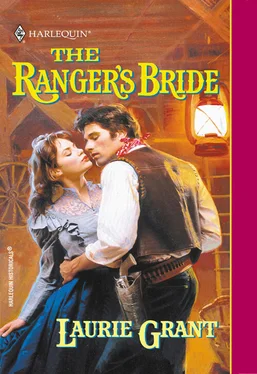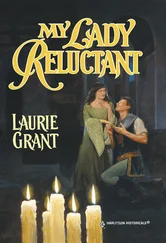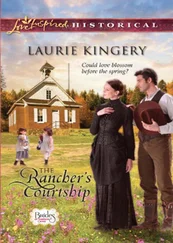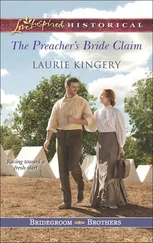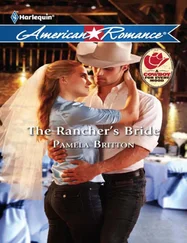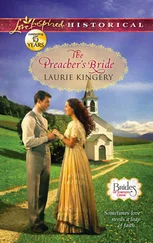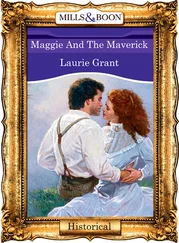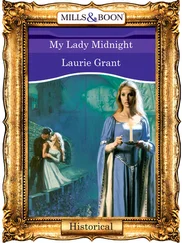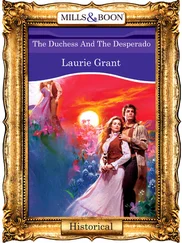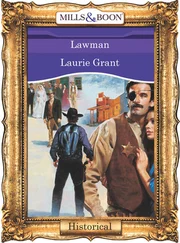“All right,” Addy called, but she had no intention of complying. The stocky girl was already so tightly laced she could hardly breathe.
Catching Lucy’s eye and putting a finger to her lips, Addy undid the back buttons, then moved to the laces at the back of the corset, but instead of tightening them, she loosened them just a bit.
Lucy gave her a grateful, conspiratorial smile.
After serving Mrs. Fickhiser the rest of the coffee and Lucy a glass of cold water from the springhouse, she set to work on the waist seam while the mayor’s wife chattered nonstop.
“You had quite an ordeal yesterday, didn’t you?” the woman asked, then, without waiting for an answer, droned on. “No wonder you look so fatigued. I’m certain you didn’t sleep a wink last night! Imagine, surviving because a dead man fell over on you! How ghastly! Why, if that had not happened—you could have met with a Fate Worse Than Death,” she intoned. “Didn’t I warn you it was dangerous to travel alone?”
“But Mama, what could be worse than dying?” Lucy asked, her round face all innocence, but there was mischief in her eyes.
“Never you mind!” Olympia snapped.
“Well, I wasn’t exactly alone,” Addy felt compelled to point out. “There were several other passengers…but perhaps we should speak of something else?” she said, darting a meaningful glance toward Lucy.
Olympia’s lips thinned, but she could hardly argue that the murderous assault on the stagecoach was a fit subject to discuss in front of her daughter.
“Of course,” she sniffed. “I merely meant to express sympathy. To change the subject, then, did you happen to hear of the couple that dared to try to buy the lot across from the mayor’s manse? No, of course you did not. This took place, I believe, while you were gone to Austin.”
Only Olympia, Addy thought wryly, would refer to her own house as a manse. “Were they not suitable in some way?” she inquired, keeping her eye on her needlework.
“Unsuitable?” the mayor’s wife crowed. “Why, that’s the understatement of the year, Mrs. Kelly! They had moved here hoping that no one would know what the woman—I shall not call her a lady—really was. But my sister in Houston—that’s where they came from, Houston—wrote and warned me.”
“Do you mean that the woman was a criminal?” Addy inquired, wondering if what Olympia Fickhiser was about to say was any more fitting a subject for an innocent young lady’s ears than murder had been.
“My dear Mrs. Kelly, perhaps not in the eyes of the law, but certainly in the eyes of decent folk. The woman had been divorced,” Olympia Fickhiser intoned in a stage whisper behind her hand.
Addy flinched at the distaste in the woman’s voice. If Olympia Fickhiser even suspected the truth about her, she would gather her skirts and sweep out of Addy’s house, telling everyone in Connor’s Crossing that the widow Kelly was actually a fallen woman whom no decent lady should patronize.
“But even if the woman had been divorced, weren’t they a married couple, or did I misunderstand?” she asked mildly.
“Supposedly, though one only has their word on that,” Olympia Fickhiser muttered in an acid voice. “I sent them running from Connor’s Crossing with their tails between their legs, I can tell you!”
Addy, imagining how the couple must have felt, said nothing.
“But surely you can understand why I could not possibly bring myself to tolerate such a scandalous couple living across the street from my innocent daughter, can’t you?” Her tone indicated Addy’s answer had better be yes, if she hoped for continued business with the mayor’s wife.
Addy would have loved to say that Lucy would probably be better off living with the supposedly scandalous couple than with such a judgmental woman as her mother, but she could not afford to. The disapproval of a pious busybody like Olympia Fickhiser could make Addy’s living on her own in this town financially impossible.
“Of course I can see why you would feel that way,” she hedged. It was women like Olympia Fickhiser who would have made Addy’s life in St. Louis hell after her divorce.
And what on earth would Olympia do if she knew Addy was harboring the Ranger in her bedroom, a man she had just met on the stage yesterday?
As if to echo her thoughts, just then a thud sounded from the back of the house, followed by a muffled sound that Addy thought might be a groan.
“What was that?” Olympia demanded suspiciously. “Is someone here?”
Good Lord, had Rede fallen out of bed? Addy leaped to her feet, throwing the gown on the chair she had just vacated.
“No, of course not,” she called over her shoulder. “I was moving a stack of books to my bedroom when you came, and it sounds as if they’ve fallen over. Let me just check—”
“But that second noise—it sounded like a cry of pain.”
“I thought so, too, Mama,” Lucy said, obviously eager to get back into her mother’s good graces by agreeing with her.
“No, I’m sure you’re mistaken,” Addy assured them, eager to run to the bedroom, her mind full of visons of Rede hemorrhaging from a reopened wound while Olympia Fickhiser babbled on. “It’s an old house, and it makes all sorts of odd noises, especially in hot weather like this.”
“Nonsense, this house isn’t that old. Your uncle built it only ten years ago.” It appeared that the mayor’s wife had every intention of following her back to the bedroom.
She had to get to Rede, but she had to stop the woman from coming with her! “I—I—I hesitate to tell you this, Mrs. Fickhiser,” Addy said desperately, “for I’m sure you’ll think it’s too silly for words, but my aunt wrote me that she’d seen the ghost of my uncle in the house. Of course, I don’t believe such a faradiddle, but my family is Scots-Irish, and you know how fanciful the Irish can be….”
Mrs. Fickhiser turned as white as the lace trim on the high neckline of her dress. “I—we have to be going,” she said, rising unsteadily to her feet. “You may deliver the dress when you’re finished with it.”
Addy watched out the window as Olympia Fickhiser, her daughter in tow, ran out the front door and into her waiting buggy.
She could barely suppress a groan of her own. Now the mayor’s wife would tell everyone the seamstress’s house was haunted, or if she feared to appear foolish, that Adelaide Kelly was mentally deranged enough to believe it was!
But she couldn’t worry about that now. She had to find out what had caused the loud thud in the back bedroom.
Addy came bursting into the room, her eyes wild and anxious, calling, “Rede, are you all right? I heard a noise—” She stopped short when she spied him sitting on the bedside chair, his feet propped comfortably on the bed.
“Sorry, Miss Addy. Didn’t mean to alarm you none. I was just a mite clumsy the first time I tried gettin’ up, and knocked the chair over on the floor. It hurt some, makin’ sure I didn’t go over with it.” He put a hand on his ribs, hoping to engage her sympathy, but her expression didn’t change. “Is that loudmouthed old biddy gone? I could hear every word she said, clear back here. I swear she could talk the hide off a longhorn bull.”
Her green eyes kindled and her lips tightened. “You shouldn’t have gotten up without help anyway, Rede Smith! You’re lucky you didn’t fall and tear open your wound! And that ‘loudmouthed old biddy,’ as you call her, is one of my best customers—or was,” she corrected herself while glowering at Rede. “Now she probably won’t ever come again, and she’ll tell everyone in Connor’s Crossing I’m demented, and then no one else will have their dresses made here, and I’ll either starve to death or have to beg my parents for my fare back to St. Louis—”
Читать дальше
